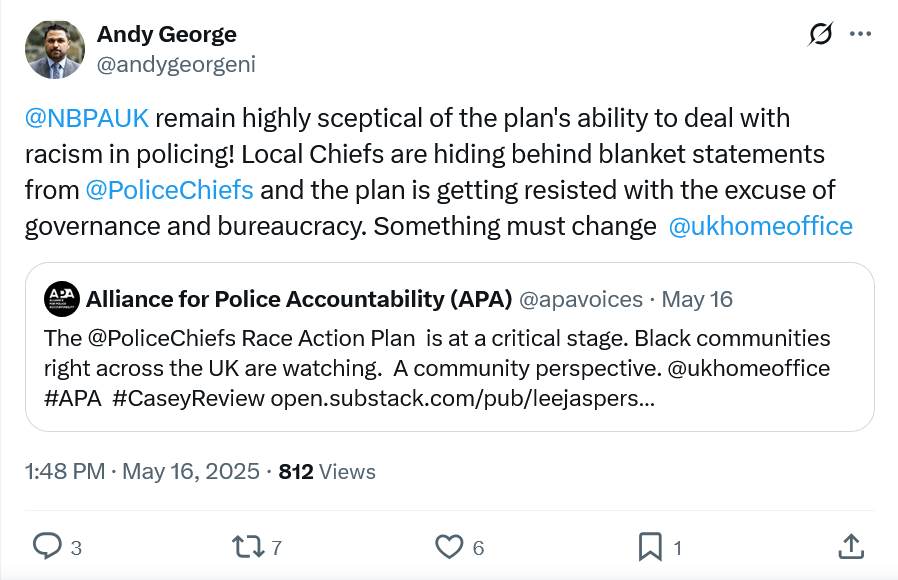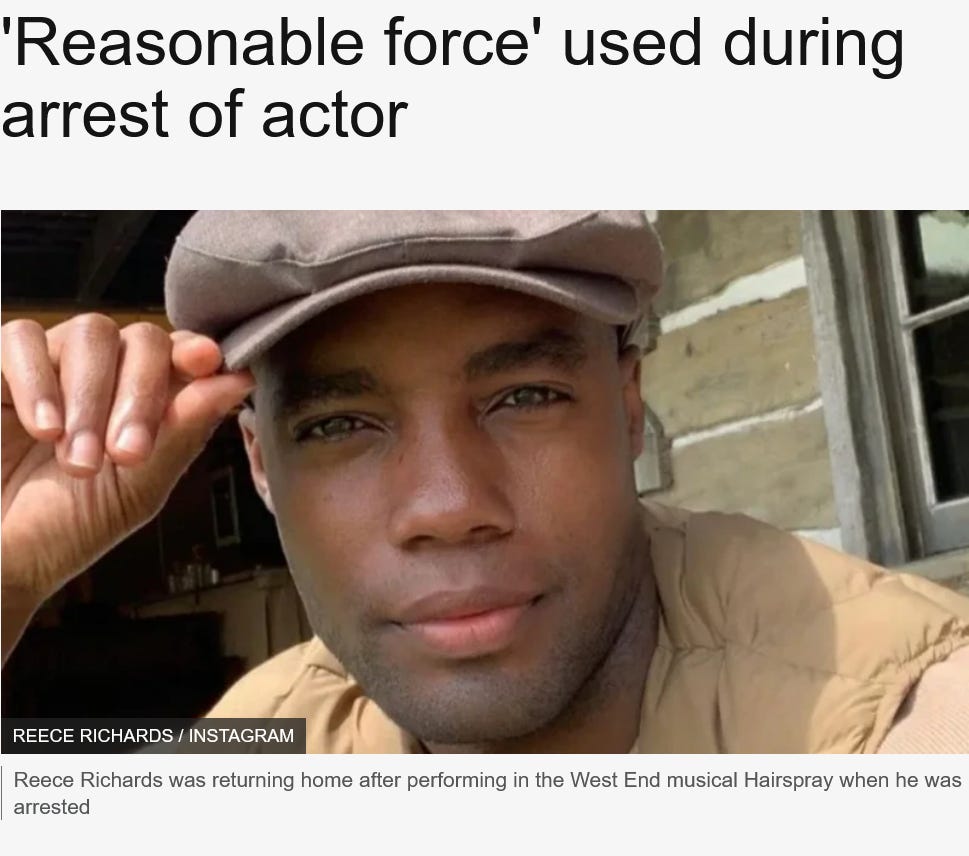May 2025: Dismissing gross misconduct
New rules see gross misconduct treated as grounds for straight dismissal, 'unless there are exceptional circumstances'. What does that mean?
Dear StopWatchers,
As the year heats up, so have police chiefs’ calls for more funding to meet the government’s anti-crime pledges. We’re seeing legacy media articles and think tank think pieces justifying the benefits of increased funding, ahead of a spending review in June.
But promises of improved public safety can be just as much about care as they are about resource capacity. And perhaps for police, nothing says ‘I care’ more than knowing not to bring tools of coercion to a situation that requires persuasion rather than force.
Take the mental health bill: as it makes its way into the House of Commons, we are making efforts to sure members of parliament exercise the opportunity to deprioritise police involvement in emergency callouts in favour of first responders’ discretion to decide if the police or a medical professional is the right person to respond to an incident. To paraphrase the former home secretary who suggested the idea, the police have no training or knowledge of how to deal with vulnerable persons experiencing mental health crises and there is every chance their police presence could actually exacerbate a situation. Our mental health briefing explains this in more detail, as did our executive director Habib Kadiri on a panel at this year’s Norwich Transformed event.
Next month, we will be – amongst other things – explaining at the Public Law Project Public Law and Technology Conference (09 June) why proposals to implement and merge new police surveillance technologies with existing information databases are also problematic for certain groups of people.
Until then, we hope you enjoy this edition of our regular monthly offering.
Dismissing gross misconduct
Gross misconduct is an immediate sacking offence for police officers now, thanks to new rules aimed at those found guilty via disciplinary hearings (Gov.uk, 07 May).
The announcement is part of a wider set of reforms to the systems that hold police officers to account. What that quite has to do with their confidence is anyone’s guess; you might think clarity and transparency were more important than officers’ feelings over being held accountable.
But that’s not the biggest problem with this policy. Guaranteeing that gross misconduct will lead to dismissal is a rule so obvious you’d think it already existed. But there remains an implicit admission that it wouldn’t prevent officers jumping before they are pushed anyway:
Proposed legislation will create a presumption of accelerated hearings for former officers, ensuring swifter proceedings for those who resign or retire before they face a misconduct hearing.
Former officers who would have been dismissed had they still been serving will continue to be barred from future service.
Stable door closed, horse bolted. Perhaps it doesn’t matter, now that dismissals are permanent. That said, it’s not over for an officer facing gross misconduct charges until the appeals process says so, as former 999 call-handler Issy Vine painfully found out in an article published the day the new rule came into effect (BBC News, 28 May). Vine complained about a colleague’s sexist and racist comments a month after the publication of Baroness Casey’s report.
She said she was so taken aback by her colleague’s “confidence” in making the comments, that initially she wondered whether it was some kind of internal test, to check if other police staff would do anything about it.
… although the staff member was investigated and sacked for gross misconduct, she was later told that he had won an appeal [and] would instead receive a written warning, because it would be “too harsh” for him to lose his job.
Ms Vine… said her experience meant she no longer trusted the force.
“All these stupid promises coming from the top, they just never trickle down into the people on the ground who are actually doing the job and the work.”
And what qualifies as gross misconduct anyways? Surely the violent manhandling of a person who was nowhere close to matching the description of a suspect?
The article reads (BBC News, 15 May):
The star of Netflix’s Sex Education said he was pepper sprayed, thrown to the ground and kicked when he was arrested in Fulham, west London, in September. Officers had mistaken him for a criminal suspect.
“He was an innocent bystander and this would have been a frightening experience,” [Amanda Rowe, director of the Independent Office for Police Conduct] said. “Mr Richards’ complaint detailed his understandable belief that he was detained and arrested because he was black, although the suspects were white.
“We found that officers were responding to a fast-moving incident and – given the only description of the suspects was that one was wearing dark clothing and their location – it was reasonable that the officer who saw Mr Richards and detained him thought he was a suspect.”
Nope. In fact, it is eminently reasonable and not at all racist to equate dark clothing with dark skin in a ‘fast-moving’ situation, according to our police watchdog.
Not to worry though. In the case of proven gross misconduct – appeals process and all – there will be a clear expectation that officers will be sacked unless there are exceptional circumstances (emphasis all ours).
Well, exceptional circumstances might turn out to be one hell of a caveat. Take the case of firearms officer W80. Despite losing both the original and appeal hearings against gross misconduct in his actions over the killing of Jermaine Baker, W80 might be free to try to overturn both rulings if a government-commissioned rapid review decides (contrary to the supreme court) that the standard of proof for judging an individual officer’s fatal use of force can be simply whether it was based on an ‘honestly held’ belief rather than whether the belief was reasonable if mistaken.
Our explanation for why overturning the precedent set by the supreme court is wrong notes the court’s reasoning that public confidence in policing was best served through setting a more stringent threshold for acceptable police conduct that allows for scrutiny through the disciplinary process.
Sadly, genuine efforts to raise standards are often resisted. Vine said bosses told her the original disciplinary panel deciding her complaint had been ‘too heavily influenced by the Casey Review’, a telling indication of the degree of denial within the force over what needs to change.
Similarly, the controversies over the creation and implementation of the Police Race Action Plan (PRAP) betray police chiefs’ uneasy relationships with both the Black Police Association and Black Brits in general.

In a recent article (05 May), Lee Jasper, chair of the Alliance for Police Accountability (APA) observed that not only in London, ‘but nationally and notwithstanding the “entente cordial” that civil society groups have with the National Police Chiefs’ Council the fact is that funding for civil society oversight of the NPCC PRAP is still unconfirmed beyond March 2026’. In effect, accountability ‘remains unfunded, unprotected, and undefined.’
To the BBC, a worn down and burnt out Vine concedes:
“I joined wanting to change and make the force better, and I was silly in thinking I could do that… I tried, I failed, so I left, and I'm going to try this way.”
On the contrary, it was not silly for Vine to try to help make the force better. It is a shame that she feels that way. But the more police forces ruin the goodwill of those who want what is best for them, the harder it is to believe that meaningful change from within is ever going to happen. In Vine’s words:
“They always say change starts from the inside. It really doesn't. You can’t get any change made, you’re not listened to or heard in a service like that.”
Sometimes it feels as though the only thing the police wish to dismiss is the concept of gross misconduct itself.
Help us overturn injustice
Unfortunately, stories like the above indicate the sorry state of racism in policing, five years to the month that George Floyd was murdered and the Black Lives Matter protests began. Pushing for positive change in this sector is an ongoing challenge, and amidst the periods of progress and setbacks, your support is invaluable. So if you have a spare penny or two, please click on the Donate button. We’d very much appreciate it.
Deaths from police contact, cases old and new
William Cameron
A former nurse working with Thames Valley police has been charged with manslaughter following the death of William Cameron after he was taken into custody at Loddon Valley Police Station, near Reading, in 2020. Mr Cameron died later that day in hospital.
Sean Cregg, who worked for Mountain Healthcare – a procured service provider for the force – has been charged with gross negligence manslaughter and a further charge under section 7 of the Health and Safety at Work Act 1974. He is due to appear at Westminster Magistrates’ Court on 1 July (BBC, 12 May).
Unnamed
A man has died after suffering a cardiac arrest in a police vehicle shortly after being detained under the Mental Health Act.
Greater Manchester police (GMP) confirmed that the man was detained under the Mental Health Act on the evening of 12 May, following a 999 call from a property in the Cutgate area of Rochdale.
Officers responded to the call at around 7pm after the man reportedly sounded unwell. GMP said that when they attended the scene, it was established that the individual was wanted in connection with alleged theft offences.
The man was taken to hospital but became unwell while still inside a police vehicle. He then suffered a cardiac arrest and was pronounced dead shortly afterwards.
In line with standard procedure, GMP has referred the incident to the IOPC for an independent investigation (Roch Valley Radio, 16 May).
Other news
Racial Profiling, Anti-Black Racism, Black Resistance and the Policing of Young Londoners (abstract): In this article, drawing on findings from an ethnographic study (2018–21) and a Participatory Action Research project in a London Borough, we explore the nature, impact, and forms of resistance to, police racial profiling. Centring accounts of ‘policed’ Black young Londoners we develop a reconceptualization of racial profiling in sociological terms as a dynamic process, understood as both didactic and dialogic (British Journal of Criminology, 03 May).
Policing and social media (abstract): This article explores the perspectives of police officers and police civilian staff in England who engage with social media as part of their professional practice. It uniquely focuses on how these police professionals use visual tools, namely photographs, videos, emojis, infographics, memes and visual GIFs as part of their communicative police practices (Criminology and Criminal Justice, 11 May).
Calls to end strip searches of Welsh children: Researchers have called for a ban on strip searching of children in Wales, with Black children disproportionately subject to the traumatising and degrading practice.
Freedom of information (FoI) requests revealed discrepancies and contradictions in the data reported by police. A total of 5,428 strip searches of children were undertaken in Wales in two years to 2023, mostly for drugs and weapons, with six cases involving under 13s, according to one review. 85 involved a more thorough or intimate search beyond removing a coat, jacket or gloves.
South Wales police was among the forces with the highest rate in Wales and England, with research suggesting Black children are strip searched four times more often than white children.
In a letter revealed under FoI, deputy chief constable Jason Davies acknowledged disproportionality in the number of ethnic minority children being strip searched. But South Wales, Dyfed Powys, and Gwent police refused to provide any data on child strip search cross-referenced by ethnicity in response to FoI requests, according to research. North Wales police were only able to confirm the presence of an appropriate adult in about half to two thirds of searches.
The researchers wrote: ‘We question whether the struggle to access data across various agencies and governments is a question of competence. It is unclear if it is a failure to achieve basic professional standards of transparency or if it is an act of obfuscation – a failure to share clear and intelligible data to avoid legal challenge.’ (Nation.Cymru, 13 May)
West Mercia police ‘adequate’ in preventing and investigating crime: The HMICFRS report follows a cause of concern which has been addressed and includes gradings in nine areas – with only one, ‘recording data about crime’, judged to be good. Four categories were ranked ‘adequate’ – including ‘police powers and public treatment’, ‘preventing crime’, ‘investigating crime’, and ‘managing offenders’. Four other categories were classes as ‘requires improvement’, including ‘responding to the public’, ‘protecting vulnerable people’, ‘developing a positive workplace’, and ‘leadership and force management’.
HMICFRS said “it was disappointing to find that the force didn’t always understand what support victims needed and were entitled to receive. Contact with victims is often based on officer availability rather than victim needs. The force has more to do here to improve the service it provides to victims.” (Shropshire Star, 14 May)
Amnesty predictive policing advert too controversial for TfL: Transport for London (TfL) has rejected Amnesty International’s advert about predictive policing for Elephant and Castle tube station. TfL are understood to have rejected the advert on the grounds it may bring other members of the Greater London Authority Group into disrepute.
The advert prompts commuters to read Amnesty’s Automated Racism: How Police Data and Algorithms Code Discrimination into Policing report.
Jodie Bradshaw described predictive policing as ‘a subjective projection of a crime which you may or may not commit, there is no presumption of innocence.’ (South East Londoner, 19 May)
Plans to link facial rec with driving licences condemned by civil liberties groups: Civil liberties campaigners fear that a government bill that will allow the police to link facial recognition technology to the driving licence database could ‘make us feel less human’.
Stopwatch policy lead Jodie Bradshaw also said: ‘We will see the disproportional criminalisation of racialised people as a result of the use of this technology’, and suggested the £55 million that the government is spending on facial recognition technology could be better spent elsewhere (Mancunian Matters, 20 May).
Damaging cannabis searches a ‘compelling’ case for decrim, says London mayor: Sir Sadiq Khan has backed the ‘compelling, evidence-led’ case for possessing small amounts of cannabis to be decriminalised because of the ‘damage’ stop-and-search causes to police relations with ethnic communities.
A three-year study into policing the Class B drug by the London Drugs Commission found that it is ‘disproportionate’ for enforcement under the Misuse of Drugs Act to continue when compared to the harms of other illegal substances.
According to the report, Londoners from a mixed ethnic background admitted being the highest users of weed in the past year (18%), followed by Black people (11%) and whites (8.5%). Asian and Arab groups are lowest at 7.7%. But Black people were searched 3.1 times more often for drugs than white people.
The report authors also stated that ‘the fact that both suspects and victims of knife, robbery and firearms offences are more likely to be Black is… not an adequate explanation for racial disproportionality in drug-related stop-and-search.’ (London Evening Standard, 28 May)
Section 60 watch*
The Met
Lewisham (25 May)
Thames Valley
Castlefield, High Wycombe (12 May)
Greater Manchester
Salford (21 May) Brunswick, Longsight, Moss Side (24 May),
* This is not a comprehensive list
Stay safe,
StopWatch.





